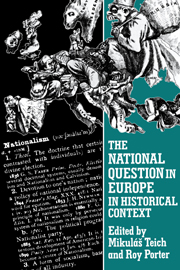Book contents
- Frontmatter
- Contents
- List of maps
- Notes on contributors
- Acknowledgements
- Introduction
- 1 The British Isles: Celt and Saxon
- 2 The making of the French nation
- 3 The national question in Italy
- 4 The roots of the national question in Spain
- 5 Shifting nationalism: Belgians, Flemings and Walloons
- 6 The nation in German history
- 7 Nationalism and nation-state in Germany
- 8 The national identity of the Austrians
- 9 The Czechs
- 10 The national question in Hungary
- 11 The union of Dalmatia with northern Croatia: a crucial question of the Croatian national integration in the nineteenth century
- 12 The national question in Poland in the twentieth century
- 13 Finland: from Napoleonic legacy to Nordic co-operation
- Index
7 - Nationalism and nation-state in Germany
Published online by Cambridge University Press: 30 November 2009
- Frontmatter
- Contents
- List of maps
- Notes on contributors
- Acknowledgements
- Introduction
- 1 The British Isles: Celt and Saxon
- 2 The making of the French nation
- 3 The national question in Italy
- 4 The roots of the national question in Spain
- 5 Shifting nationalism: Belgians, Flemings and Walloons
- 6 The nation in German history
- 7 Nationalism and nation-state in Germany
- 8 The national identity of the Austrians
- 9 The Czechs
- 10 The national question in Hungary
- 11 The union of Dalmatia with northern Croatia: a crucial question of the Croatian national integration in the nineteenth century
- 12 The national question in Poland in the twentieth century
- 13 Finland: from Napoleonic legacy to Nordic co-operation
- Index
Summary
Until recently, the history of nationalism in Germany has mainly been treated as the history of its thinkers, with the focus on ideas and not on interests. The research methods have been those of the intellectual historian and not of the social historian. They tend to be phenomenalist rather than analytical.
The problems with this approach are evident. In 1972 the American historian Robert Berdahl mentioned some of the questions which still have to be answered satisfactorily:
What was the relationship between the ideas and the political reality? How did the ideas of the intellectual elite become the experience of the nation? Or, if early nationalists merely articulated sentiments that were felt less keenly by a broad spectrum of the population, what new experiences generated the new nationalist thought? Finally, what happened between 1800 and 1848 that increased the appeal of nationalism as a political movement?
Although Berdahl is concerned with the period preceding the March Revolution of 1848 in Germany, his dissatisfaction with the results of the existing body of research can still be expressed in general terms. If we want to explain the origins and changes which took place in German nationalism, we must first enquire into its social preconditions.
- Type
- Chapter
- Information
- The National Question in Europe in Historical Context , pp. 181 - 195Publisher: Cambridge University PressPrint publication year: 1993
- 3
- Cited by



